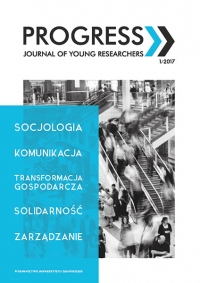Problem of Reductionism in the Context of the Relations between Biology and Sociology
Keywords:
reductionism, biology, sociology, sociobiology, neurosociologyAbstract
In the article author discusses the three cases. First, how one should correctly express the problem of reductionism? Second, how many types of reductionism can we distinguish? Third, do contemporary attempts of linking biology and sociology are different, in terms of reductionist tendencies, from sociology? Using five-part typology of reductionism, the author indicates that the problem of reductionism can be taken only if some elements of sociology are eliminated in the process of theoretical or causal reduction. Analysing the assumptions of strong sociobiology, the author suggests that a lot of accusation were directed not against biologically complement sociological explanations, but rather against imperialist tendencies of sociobiology which tried to rebuild sociology. Unlike to sociobiology, newest approaches linking biology and sociology do not make such mistakes, hence the problem of reductionism is not relating to them.
Downloads
References
Alcock J., 2001, The Triumph of Sociobiology, New York: Oxford University Press.
Alexander J.C. (ed.), 1987, The Micro-Macro Link, Berkeley: University of California Press.
Buss D.M., 2001, Psychologia ewolucyjna, tłum. M. Orski, Gdańsk: Gdańskie Wydawnictwo Psychologiczne.
Crick F., 1997, Zdumiewająca hipoteza, czyli Nauka w poszukiwaniu duszy, tłum. B. Chacińska-Abramowicz, M. Abrahamowicz, Warszawa: Prószyński i S-ka.
Davis J., 2013, Persistent Inequality: A Neurosociological Perspective [w:] Handbook of Neurosociology, eds. D.D. Franks, J.H. Turner, Dordrecht–New York: Springer.
D’Ettorre P., Hughes D.P., 2008, Sociobiology of Communication. An Interdisciplinary Perspective, Oxford–New York: Oxford University Press.
Franks D.D., 2010, Neurosociology. The Nexus between Neuroscience and Social Psychology, New York–London: Springer.
Franks D.D., Turner J.H. (eds.), 2013, Handbook of Neurosociology, Dordrecht–New York: Springer.
Guo G., 2006, The Linking of Sociology and Biology, „Social Forces”, Vol. 85, Iss. 1.
Heinskou M.B., Liebst L.S., 2016, On the Elementary Neural Forms of Micro-Interactional Rituals: Integrating Autonomic Nervous System Functioning into Interaction Ritual Theory, „Sociological Forum”, Vol. 31, Iss. 2.
Lewontin R.C., 1991, Socjobiologia: jeszcze jeden determinizm biologiczny, tłum. J. Szacki [w:] Człowiek, zwierzę społeczne, wyb. B. Szacka, J. Szacki, wstęp B. Szacka, tłum. K. Najder, B. Szacka, J. Szacki, Warszawa: Czytelnik.
Lynn R., 1991, Socjobiologia nacjonalizmu, tłum. B. Szacka [w:] Człowiek, zwierzę społeczne, wyb. B. Szacka, J. Szacki, wstęp B. Szacka, tłum. K. Najder, B. Szacka, J. Szacki, Warszawa: Czytelnik.
Maryanski A., 1994, The Pursuit of Human Nature in Sociobiology and Evolutionary Sociology, „Sociological Perspectives”, Vol. 37, No. 3.
Mazur A., 2005, Biosociology of Dominance and Deference, Lanham: Rowman & Littlefield.
Mead G.H., 1975, Umysł, osobowość i społeczeństwo, tłum. Z. Wolińska, wstęp A. Kłosowska, Warszawa: PWN.
Murphy N., 2003, What Ever Happened to the Soul?: Theological Perspectives on Neuroscience and the Self [w:] The Self from Soul to Brain, eds. J. LeDoux, J. Debiec, H. Moss, New York: New York Academy of Sciences.
Nagel E., 1970, Struktura nauki. Zagadnienia logiki wyjaśnień naukowych, tłum. J. Giedymin, B. Rassalski, H. Eilstein, Warszawa: PWN.
Noble K.G. et al., 2012, Neural Correlates of Socioeconomic Status in the Developing Human Brain, „Developmental Science”, Vol. 15, Iss. 4.
Paprzycka K., 2008, Czy (powinniśmy uznać, że) wiedzielibyśmy wszystko o umyśle, gdybyśmy wiedzieli wszystko o mózgu? Spór o redukcjonizm i reduktywizm w fi lozofi i umysłu, „Nauka”, nr 2.
Perry B.L. (ed.), 2015, Genetics, Health and Society, London: Emerald.
Rancew-Sikora D., 2007, Analiza konwersacyjna jako metoda badania rozmów codziennych, Warszawa: Trio.
Remisiewicz Ł., [b.d.], Neurosocjologia – nowy paradygmat na mapie relacji socjologii z biologią, „Humaniora” [w recenzji].
Remisiewicz Ł., 2016, Intelligence and Persistent Inequality. A Sketch of a Neurosociological Model, VIII Krakowska Konferencja Kognitywistyczna „Inteligencja”, Instytut Psychologii Uniwersytetu Jagiellońskiego, 19 marca.
Richerson P.J., Boyd R., 2006, Not by Genes Alone. How Culture Transformed Human Evolution, Chicago: University of Chicago Press.
Sahlins M., 1991, Krytyka wulgarnej socjobiologii, tłum. B. Szacka [w:] Człowiek, zwierzę społeczne, wyb. B. Szacka, J. Szacki, wstęp B. Szacka, tłum. K. Najder, B. Szacka, J. Szacki, Warszawa: Czytelnik.
Sloan P.R., 2011, „Paideia” in a Post-Darwinian World: Reconnecting Education and Biology [w:] Who Are We? Old, New, and Timeless Answers from Core Texts. Selected Papers from the Fourteenth Annual Conference of the Association for Core Texts and Courses, Plymouth, Massachusetts, April 3–6, 2008, eds. R.D. Anderson, M.B. Flynn, J.S. Lee, Lanham: University Press of America.
Słownik Języka Polskiego PWN, 2016, http://sjp.pwn.pl/sjp/redukowac;2573616.html [dostęp: 12.07.2016].
Sociobiology Study Group of Science for the People, 1991, Socjobiologia: nowy determinizm biologiczny, tłum. B. Szacka [w:] Człowiek, zwierzę społeczne, wyb. B. Szacka, J. Szacki, wstęp B. Szacka, tłum. K. Najder, B. Szacka, J. Szacki, Warszawa: Czytelnik.
Tilly C., 1998, Durable Inequality, Berkeley: University of California Press.
Turner J.H., 2004, How I Became, to My Great Surprise, a Bio-Sociologist, „Newsletter of the ASA Section on Evolution and Social Behavior”, Vol. 1.
Wilson E.O., 1975, Sociobiology: The New Synthesis, Cambridge: Harvard University Press.
Wilson E.O., 1998, O naturze ludzkiej, tłum. B. Szacka, Poznań: Zysk i S-ka.
Wilson E.O., 2000, Socjobiologia, tłum. M. Siemiński, Poznań: Zysk i S-ka.
Wilson E.O., 2002, Konsiliencja. Jedność wiedzy, tłum. J. Mikos, Poznań: Zysk i S-ka.
Wright R., 2004, Moralne zwierzę. Dlaczego jesteśmy tacy, a nie inni: psychologia ewolucyjna a życie codzienne, tłum. H. Jankowska, Warszawa: Prószyński i S-ka.
Życiński J., 1995, How to De-Ruse Sociobiological Theory of Knowledge? [w:] The Problem of Rationality in Science and its Philosophy. On Popper vs. Polanyi. The Polish Conferences 1988–89, ed. J. Misiek, Dordrecht: Springer.
Downloads
Published
How to Cite
Issue
Section
License
Copyright (c) 2017 Author(s)

This work is licensed under a Creative Commons Attribution 4.0 International License.

 Academic Scientific Journals
Academic Scientific Journals




